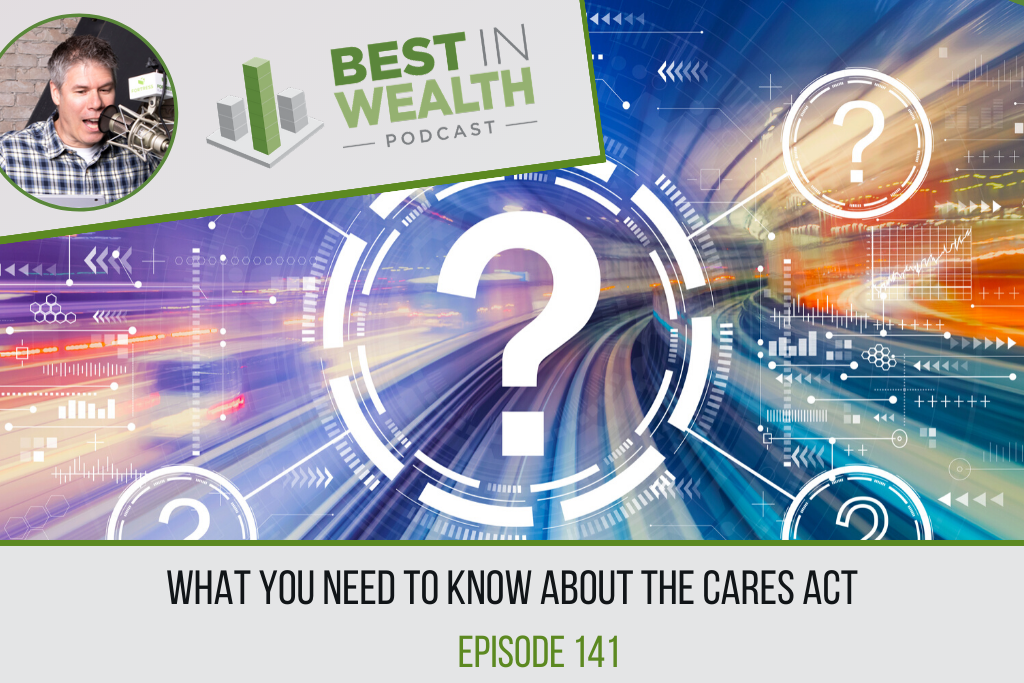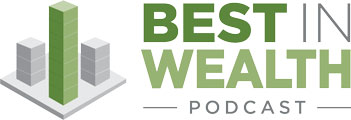What you NEED to Know About the CARES Act, Ep #141

The CARES Act—Coronavirus Aid, Relief, and Economic Security Act—is at the forefront of everyone’s mind right now. It’s an estimated $2 trillion relief package with over $500 billion being allocated to individual rebate checks. $500 billion is being dispersed to affected industries, $400 billion for small businesses, $300 billion for state and local government, and $150 billion for hospitals and healthcare systems.
That is a LOT of money. In this episode of Best in Wealth, I aim to help you understand what affects you as an individual. I’ll cover who qualifies for a recovery rebate check and how it’s calculated. I’ll also talk about when and how you’ll be receiving the money—and what the government wants you to do with it. Don’t miss this episode that’s packed full of need-to-know information.
In this episode of Best in #Wealth I dissect what you NEED to know about the CARES Act—and the rebate check you may get. Don’t miss it! #retirement #investing #PersonalFinance #FinancialPlanning #RetirementPlanning #WealthManagement #Coronavirus Click To TweetOutline of This Episode
- [2:13] Every corner of our house is spotless
- [3:28] Breaking down the CARES Act
- [5:21] Details on the recovery rebate checks
- [12:40] How your qualification will be calculated
- [17:57] WHERE and WHEN will we be paid?
- [20:16] How else will the CARES Act help?
- [27:35] Embrace the practice of patience
Breaking down the recovery rebate check
Everyone is eligible for a rebate check. Just let that sink in for a second. Every single adult qualifies up to $1,200 and couples filing jointly up to $2,400 in total. You will receive up to $500 for each child under the age of 17 (NOTE: that does NOT include ages 17 & over). The average family with two children would receive $3,400 in total.
Notice how I said “up to” in the previous paragraph. That’s because there are thresholds in place—for every $100 you are over the threshold you lose $5 of the rebate check. For an individual, the income threshold is $75,000. If you are married-filing-jointly, the threshold is $150,000. Hypothetically speaking, if you are married and have 4 children (with an excluded 17 year old), you would qualify for $3,900. If you make $176,000, then you are $26,000 above the threshold. $5 being removed for every $100 is a 5% deduction. 5% of $26,000 is $1,300. So the maximum you would have received is $3,900 minus $1,300 = a $2,600 rebate check.
Keep in mind this is calculated from your adjusted gross income—so student loan interest payments, IRA or HSA contributions, etc. would be excluded from the calculation.
How are they calculating WHO will receive the rebates?
If you have filed your 2019 taxes, your rebate will be based on your 2019 return. If you have not already filed your 2019 taxes, they will determine who gets the rebate based on your 2018 tax return. If you have not filed and made less in 2019 than you did in 2018—file immediately. If you made more in 2019, hold off on filing your tax return if it puts you over the threshold (but be sure to file before July 15th). Technically speaking, this is a 2020 tax rebate. Luckily, if you receive the rebate check, then you file your tax return for 2019 and you are over the threshold, you will not have to return the money.
The downside is for those who made well over the threshold in 2018/2019 but have since been laid off—joining the 3.3 million people who have already filed for unemployment. Your taxes will indicate that you do not deserve the rebate check—until you file for 2020. If you fall under the threshold at that point, then you will receive the rebate after filing 2020 taxes.
How are they calculating WHO will receive the #Coronavirus relief rebate checks? Listen to this episode of Best in #Wealth for the details! #retirement #investing #PersonalFinance #FinancialPlanning #RetirementPlanning #WealthManagement Click To TweetWhat is the payment time-frame and delivery method?
If you received your last tax return to a bank account via direct deposit, that’s how you will receive the rebate check. If you were mailed a check, it will be sent to your last known address that was submitted with the tax return.
Treasury Secretary Steven Mnuchin says the expectation is that “most people” will get their payments by April 17. However, that does not include those who received their last tax-return by paper check. It also does not include anyone who may have to amend bank accounts.
The government will supposedly set up a portal (and have a phone number available) for anyone who needs to submit a change of address or different bank routing information. If you fall into this category, it will likely be longer before you receive a check.
Other ways the CARES Act can benefit you
During this time frame, if you have been impacted by the Coronavirus—and the IRS is being very liberal with this—it changes distributions you can take out of retirement accounts. You can take out up to $100,000 from your IRAs, 401(k), 403B, 457, Simple IRA, SEP IRA, etc. and not have to pay the 10% penalty if you are under age 59 ½. Secondly, the federal government will not take 20% out for Federal taxes upfront.
You can take up to three years to put the money back into your IRA. Or you can also take the distribution now and not repay your account. If you do not plan to repay the amount taken out, you can spread the taxes over three tax years or have all of it count against 2020 taxes. This is especially helpful if you have recently lost your job and find yourself in a lower tax bracket.
I share a few other ways the CARES Act impacts you in the remainder of the episode. Be sure to listen for details!
Learn other ways the CARES Act can benefit you (other than a check) in this episode of Best in #Wealth. #retirement #investing #PersonalFinance #FinancialPlanning #RetirementPlanning #WealthManagement Click To TweetResources & People Mentioned
Connect With Scott Wellens
- Schedule a discovery call with Scott
- Send a message to Scott
- Visit Fortress Planning Group
- Connect with Scott on LinkedIn
- Follow Scott on Twitter
- Fortress Planning Group on Facebook
Podcast Disclaimer:
The Best In Wealth Podcast is hosted by Scott Wellens. Scott Wellens is the principal at Fortress Planning Group. Fortress Planning Group is a registered investment advisory firm regulated by the Securities Act of Wisconsin in accordance and compliance with securities laws and regulations. Fortress Planning Group does not render or offer to render personalized investment or tax advice through the Best In Wealth Podcast. The information provided is for informational purposes only and does not constitute financial, tax, investment or legal advice.



